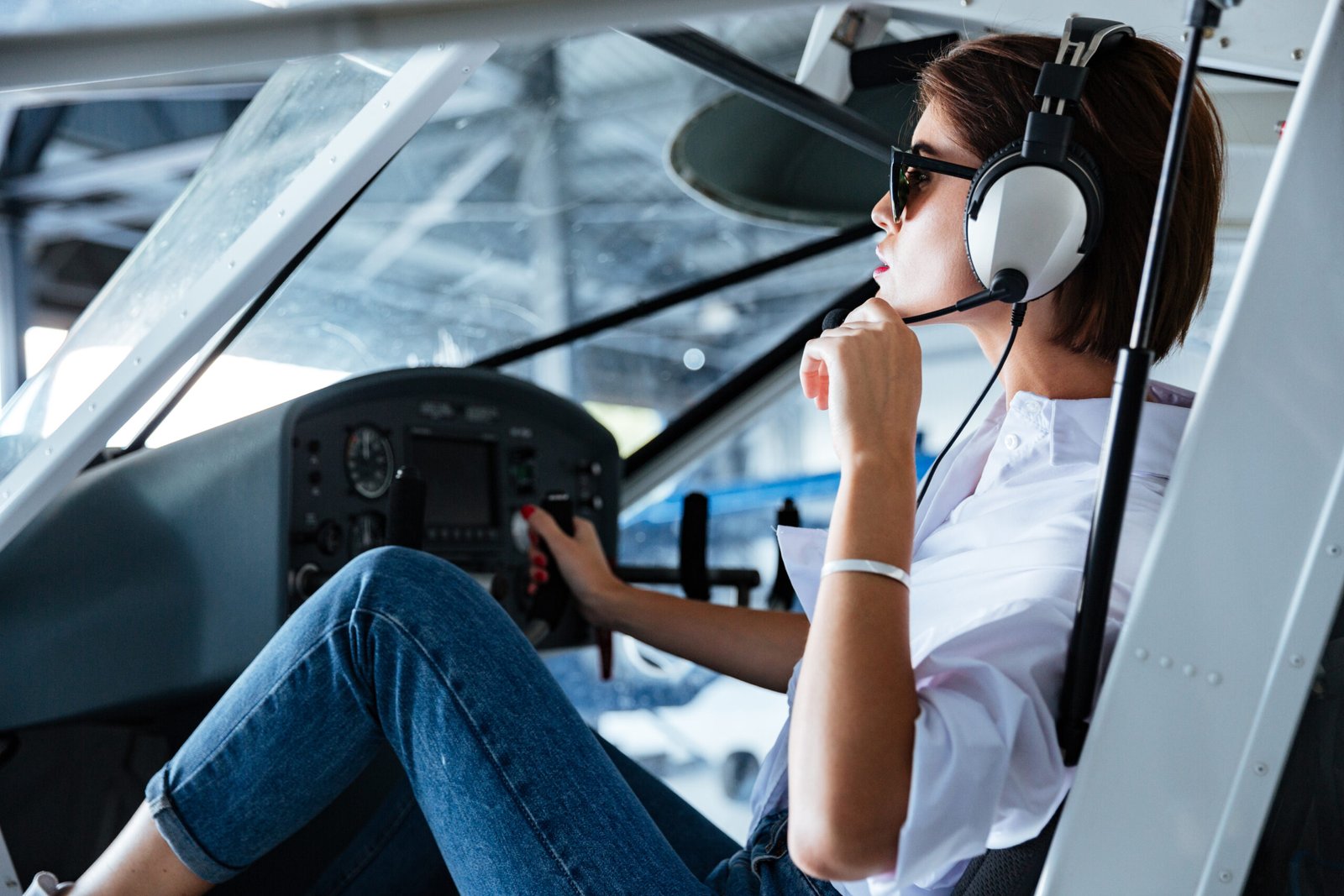sustainable aviation
Flight Paths: How Aviation Is Shaping a Sustainable Future
As we soar into the future, aviation stands at the crossroads of innovation and sustainability. With a growing emphasis on eco-friendly practices and technology, aspiring aviators can find numerous educational pathways to prepare them for this dynamic industry. Whether you’re interested in becoming a pilot, aircraft mechanic, or air traffic controller, there are various aviation schools that cater to different aspirations.
*Types of Courses Offered in Aviation Schools**
Aviation education is incredibly diverse. At its core, you’ll find programs ranging from traditional flight training to specialized courses:
1. **Pilot Training Programs**: These are designed for those who dream of flying commercial or private planes. From private pilot licenses (PPLs) to airline transport pilot licenses (ATPLs), students learn everything from basic navigation to advanced flight maneuvers.

2. **Aircraft Maintenance and Engineering**: For those fascinated by the mechanics behind flight, these programs teach skills essential for maintaining and repairing aircraft. Students delve into subjects such as aerodynamics, propulsion systems, and aviation regulations.
3. **Aviation Management**: This track focuses on the business side of aviation—ideal for future managers or administrators in airlines or airports. Coursework typically includes operations management, financial analysis, and strategic planning.
4. **Air Traffic Control Training**: Air traffic controllers play a crucial role in ensuring safe takeoffs and landings. Specialized training prepares students for managing airspace effectively while maintaining safety protocols.
5. **Unmanned Aerial Systems (UAS)**: With drones becoming an integral part of both commercial and recreational flying, many schools now offer courses focused on drone piloting and applications.
The variety of options ensures that there’s something for everyone with an interest in aviation!
*Top Aviation Blogs & Websites**
In today’s digital age, staying informed about the latest trends in aviation is easier than ever! Here’s a list of some must-follow blogs and websites:
**Airways Magazine**: Offers news articles covering current events in airlines and airport operations.
**Flying Magazine**: A great resource filled with tips on flying techniques, aircraft reviews, and personal stories from pilots.
**AeroNews Network**: Provides updates on everything from legal changes affecting aviation to new technological advancements.
**FlightAware Blog**: Focuses on global flight tracking—perfect for enthusiasts wanting real-time information.
Social media platforms also serve as invaluable resources:
Join Facebook groups like “General Aviation Pilots” or “Aviation Enthusiasts” where members share experiences and advice.
On Instagram, follow accounts like @aviationdaily that showcase stunning aerial photography alongside industry news.
Twitter handles such as @AvGeekNation often tweet breaking news related to flights around the world.
These platforms foster communities that expand your knowledge while connecting you with fellow aviators!
*FAA Flight Schools & Simulators**
For anyone serious about pursuing a career in aviation within the United States, enrolling in FAA-certified flight schools is essential. These institutions ensure compliance with federal regulations while providing high-quality training environments.
Many schools offer state-of-the-art simulators allowing students to practice in realistic settings before stepping foot into an actual cockpit—an essential tool that enhances safety measures during initial training stages.
Whether you’re looking at local options or renowned institutions like Embry-Riddle Aeronautical University or Purdue University’s School of Aviation Technology—the world is brimming with opportunities tailored specifically for you!
The future of aviation leans towards sustainability—not just through cleaner technologies but through education as well! With various courses available across numerous platforms dedicated to sharing knowledge about this exhilarating field—it’s time to buckle up for an exciting journey ahead!
The Green Skies Ahead: Innovations in Sustainable Aviation
As the world increasingly confronts climate change, the aviation industry is soaring into a new era of sustainability. With cutting-edge technologies and innovative practices taking flight, the horizon looks promising for eco-friendly air travel. To navigate this transformation, aspiring aviators and aviation enthusiasts can turn to various educational resources and platforms. Here’s a look at what’s available.

### Aviation Schools by Types of Courses
Aviation education has diversified significantly, catering to different interests within the field. Various schools offer specialized programs that equip students with essential skills:
1. **Flight Training Schools**: These institutions focus on teaching students how to fly aircraft safely. Programs often include ground school training alongside hands-on flight experiences.
2. **Aeronautical Engineering Colleges**: For those intrigued by the mechanics of flight, these colleges delve into design, development, and maintenance of aircraft systems.
3. **Aviation Management Programs**: If you’re inclined towards business aspects such as airport operations or airline management, these programs combine aviation knowledge with management principles.
4. **Air Traffic Control Schools**: Aspiring controllers can find dedicated courses aimed at preparing them for the high-stakes environment of managing air traffic.
5. **Drone Technology Courses**: With drones becoming a significant player in both commercial and recreational sectors, specialized courses provide insights into unmanned aerial vehicle (UAV) operations and regulations.
Each type of course presents unique opportunities to contribute to a more sustainable aviation future through innovation and technology.
### Lists of Aviation Blogs, Websites, Social Media Sites
In an age where information is just a click away, numerous blogs and websites serve as valuable resources for anyone interested in aviation advancements:
**Airline Reporter**: A blog that covers news about airlines while focusing on innovations in passenger experience.
**Flying Magazine**: Targeting pilots and enthusiasts alike, this publication offers articles ranging from safety tips to reviews on the latest aircraft technologies.
**AeroNews Network**: This site aggregates news from various sources about developments in aviation law, safety regulations, and sustainability efforts.
**Simple Flying**: A social media favorite that combines engaging articles with vibrant images showcasing modern aircraft.
For real-time updates on sustainable aviation initiatives or innovations:
Follow hashtags like #SustainableAviation or #GreenAviation across platforms like Twitter and Instagram for a community-driven perspective.
LinkedIn groups focused on aerospace engineering discuss trends shaping eco-friendly practices in aviation industries globally.
### FAA Flight Schools / Airplane Schools / Simulators
The Federal Aviation Administration (FAA) plays a crucial role in regulating pilot training standards in the U.S., ensuring that schools meet rigorous criteria. FAA-approved flight schools are pivotal for those looking to gain their private pilot license or advance their skills:
1. **Part 141 Flight Schools**: These institutions follow structured curricula set by the FAA—ideal for students seeking professional careers quickly.
2. **Part 61 Flight Schools**: More flexible than Part 141 schools; they allow students to progress at their own pace while still meeting FAA requirements.
Additionally, many modern schools incorporate advanced simulators into their curriculum—providing an immersive learning experience without leaving the ground! These simulators allow students to practice emergency procedures or complex maneuvers safely—an invaluable asset toward fostering responsible flying habits as we shift towards greener skies.
With these tools at hand—from diverse educational pathways to insightful online communities—the future of sustainable aviation is not just a dream but an achievable reality waiting to take off! The skies ahead are indeed green—and filled with potential for those ready to navigate them responsibly!
Cloud Chasers: The Rise of Sustainable Aviation Practices
The aviation industry is undergoing a transformative shift as sustainability takes center stage. With increased awareness of environmental impacts, innovative minds are spearheading efforts to reduce carbon footprints while ensuring safe and efficient air travel. In this evolving landscape, aviation schools play a crucial role in educating the next generation of aviators on sustainable practices.
Aviation schools today offer diverse course types tailored to meet varying interests and career paths. For those eager to take to the skies, traditional flight training programs remain popular, providing hands-on experience in piloting aircraft. These programs typically encompass ground school courses that cover essential subjects like navigation, meteorology, and regulations.
Meanwhile, aspiring engineers and technicians can choose from specialized programs focused on aircraft maintenance and design. These courses delve into propulsion systems, aerodynamics, and even the latest advancements in eco-friendly technologies such as electric propulsion systems. Additionally, workshops on unmanned aerial vehicles (UAVs) are gaining traction as drone applications soar across industries—from agriculture to disaster response.
For those interested in broader industry insights or administrative roles, degrees in aviation management are also available. These programs often explore operational efficiencies alongside sustainability practices that minimize environmental impacts. Graduates emerge not only with a solid understanding of aviation operations but also with strategies for embracing green initiatives within their organizations.
As students embark on their educational journeys, numerous resources can help keep them informed about trends and developments in sustainable aviation practices. A plethora of blogs dedicated to aviation exists online—each packed with invaluable insights. Notable mentions include “The Air Current,” which discusses innovations shaping the future of flight; “Flying Magazine,” known for its engaging articles covering everything from pilot stories to technical analyses; and “Aviation Week,” an industry staple offering comprehensive coverage on aerospace developments.
In addition to blogs, various websites serve as treasure troves for enthusiasts seeking knowledge about sustainable practices in aviation. The International Air Transport Association (IATA) provides extensive reports on emissions reductions and industry goals for sustainability. Similarly, Sustainable Aviation Fuel Users Group (SAFUG) offers updates on alternative fuels that are revolutionizing air transport.

Social media platforms have become vibrant hubs for sharing information about sustainable aviation initiatives too! Twitter accounts like @GreenerAviation focus on the latest green tech breakthroughs while Instagram pages like @SustainableAviation showcase stunning visuals from eco-conscious airlines striving toward greener skies.

Moreover, FAA-approved flight schools provide rigorous training grounded in safety standards while increasingly integrating sustainability into their curriculums. Schools such as Embry-Riddle Aeronautical University and Purdue University not only prepare students for successful careers but also emphasize environmentally responsible flying techniques through simulator training sessions that replicate real-life scenarios involving fuel efficiency measures.
Flight simulators have gained popularity as they allow aspiring pilots to practice without incurring significant environmental costs related to actual flights—an ideal solution considering today’s emphasis on reducing emissions during training phases.
In summary, the rise of sustainable aviation practices reflects a collective commitment within the industry toward greener skies—a mission where education plays a pivotal role. As we witness ongoing advancements in technology coupled with robust educational offerings across various domains of aviation studies—from flight training to management—future cloud chasers are equipped better than ever before to lead this vital charge into an eco-friendlier era of air travel!
The Future of Flight: How Sustainable Aviation is Changing the Skies
As we soar into an era where environmental consciousness shapes every industry, aviation isn’t lagging behind. The skies are evolving with a wave of sustainable practices that promise to revolutionize air travel. One of the key elements fueling this transformation is education; aspiring aviators now have access to a variety of courses tailored for the future of flight.

*Aviation Schools and Their Courses**
The landscape of aviation education has diversified significantly over recent years. Today, students can choose from several types of programs depending on their interests and career aspirations.
1. **Pilot Training Programs**: These are perhaps the most well-known courses, offering practical instruction in flying various aircraft, alongside ground school that covers navigation, weather patterns, and regulations.
2. **Aeronautical Engineering Degrees**: For those fascinated by the mechanics behind flight, these programs delve into aircraft design and construction. With a focus on innovation in sustainable technologies like electric propulsion or biofuels, students learn how to engineer greener solutions for tomorrow’s airplanes.
3. **Air Traffic Control Training**: As air traffic increases with more flights taking off globally, efficient management becomes crucial. These specialized courses train individuals to ensure safety and efficiency in busy skies while integrating new technologies aimed at reducing delays and emissions.
4. **Aviation Management Programs**: From airport operations to airline management, these courses prepare future leaders to navigate the complexities of the aviation sector—especially as sustainability becomes a central theme in operational strategies.
5. **Drone Pilot Certification**: With drones gaining popularity across industries—from delivery services to agricultural monitoring—these programs provide hands-on training for operating unmanned aerial vehicles safely and effectively.
With such a range of educational opportunities available, aspiring aviators can find their niche while contributing to sustainable practices within aviation.
*Engaging with Aviation Online**
In our digital age, staying informed about industry trends is easier than ever thanks to numerous blogs and websites dedicated to aviation topics:
**Airline Reporter**: This site offers insights into airline news along with articles focusing on innovations.
**AvGeekery**: A hub for enthusiasts sharing experiences ranging from travel tips to technical discussions about aircraft.
**Flying Magazine**: Covering everything from pilot stories to gear reviews, this publication keeps readers updated on all things aviation.
Social media platforms also serve as vibrant communities for sharing knowledge:
On Twitter, accounts like @FlightAware provide real-time flight tracking information.
Instagram pages such as @aviationlovers showcase breathtaking aerial photography from around the world.
YouTube channels like “Mentour Pilot” offer informative videos discussing aviation technology advancements and pilot experiences.
These resources create an engaging network where both professionals and enthusiasts can connect over their shared passion for flight.
*FAA Flight Schools and Simulators**
For those serious about pursuing a career in aviation, enrolling in FAA-approved flight schools is essential. These institutions not only adhere to strict regulations but also often incorporate cutting-edge technology into their curriculum.
Many schools utilize advanced simulators that mimic real-life flying conditions without leaving the ground—a vital tool for budding pilots looking to hone their skills safely before taking control of an actual aircraft. This blend of practical experience alongside simulated training prepares them effectively for challenges they may face once airborne.
As we look towards the horizon filled with possibilities brought by sustainable practices in aviation—be it through innovative designs or educated pilots—the future indeed appears bright for both our skies and our planet!
Green Skies Ahead: The Evolution of Sustainable Aviation Practices
The aviation industry is undergoing a significant transformation, embracing sustainability like never before. With the increasing awareness of climate change and the urgent need for eco-friendly practices, aviation schools are adapting their curricula to prepare the next generation of pilots and engineers for a greener future. As we soar into a new era, let’s explore various types of aviation courses available today, along with influential blogs, websites, and social media platforms that champion sustainable aviation.
### Types of Courses Offered by Aviation Schools
Aviation education has diversified significantly over recent years. Here’s a glimpse into some common course types offered at various institutions:
1. **Pilot Training Programs**: These foundational courses teach students to fly aircraft safely and efficiently. Many programs now incorporate modules on eco-flying techniques, focusing on reducing fuel consumption during flight.
2. **Aerospace Engineering Degrees**: Aspiring engineers can delve into design principles that prioritize sustainability—think lightweight materials or energy-efficient engines.
3. **Air Traffic Control Training**: As air traffic management evolves, so does its curriculum. Students learn about efficient routing technologies that minimize delays and reduce carbon footprints.
4. **Airport Management Courses**: Future airport managers are taught about green operations, from waste management systems to renewable energy implementations at airport facilities.
5. **Unmanned Aircraft Systems (UAS)**: With drones becoming increasingly popular for both commercial and recreational use, UAS programs often emphasize sustainable applications such as environmental monitoring and agricultural support.

### Influential Aviation Blogs and Websites
For those keen on staying updated on sustainable practices in aviation, here’s a list of notable blogs and websites worth exploring:
**Air Transport World (ATW)**: This publication covers all facets of the airline industry with an emphasis on innovations in sustainability.
**FlightGlobal**: A comprehensive source for aviation news that frequently highlights developments in green technology within aerospace.
**Sustainable Aviation**: A focused platform dedicated to promoting sustainable practices among airlines and manufacturers alike.
**The Air Current**: Offers in-depth analysis on the business side of aviation while discussing emerging trends like electric aircraft.
**Green Air Online**: A reliable source for articles specifically centered around reducing environmental impacts throughout the sector.
### Social Media Platforms Driving Change
Social media plays a pivotal role in shaping conversations around sustainable aviation practices. Engaging platforms include:
**Twitter**: Following accounts like @GreenAirOnline or @AeroTimeNews provides instant updates about innovations in eco-friendly flying.
**LinkedIn Groups**: Groups such as “Sustainable Aviation” offer networking opportunities for professionals passionate about greener skies.
**Instagram Accounts**: Many pilots showcase their journeys while advocating for responsible flying through visually stunning posts that spark interest in sustainability.
### FAA Flight Schools and Simulators
When it comes to practical training under federal regulations, FAA-approved flight schools are essential resources for budding aviators seeking proficiency while keeping ecological concerns in mind:
1. **FlightSafety International** offers advanced simulator training programs designed to enhance pilot skills without excessive fuel consumption during training flights.
2. **ATP Flight School**, one of the largest nationwide schools, incorporates modern aircraft technology focused on efficiency when providing flight instruction.
3. Local community colleges often host FAA-certified programs where students can learn using simulators equipped with eco-friendly technology aimed at minimizing environmental impact during exercises.
As we look forward to greener skies ahead, educational institutions play an invaluable role in molding future professionals who will ensure that sustainability becomes an integral part of our flying experience. By honing their skills through diverse courses while engaging with dynamic online communities and utilizing cutting-edge training methods, these individuals will be well-equipped to lead the charge toward a more environmentally-conscious aviation industry.




